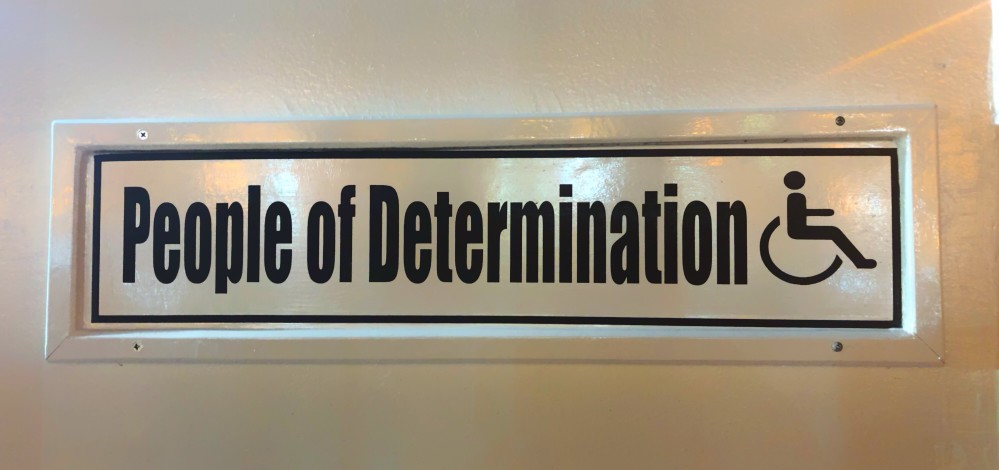Judgement Review – ‘Mental Illness Can Vary And Still Be Lifelong’ For Gainful Employment

Written By: Suruchi Kumar, 🖊 edited by Varna
Note from the Editor: ‘Legal Updates’ is a refreshed series at Ungender Insights. These are medium-length pieces authored by a labour lawyer or legal expert intended to clarify aspects of new judgements, case law or statutes across Indian courts with a view to provide insights as applicable to issues of Diversity and Inclusion (D&I) across India. We hope the series is of interest to law practitoners, industry leaders and to you as a D&I practitioner too.
Trigger Warning ∝: This article deals with a judgement pertaining to mental health, should you have any concerns about your or anyone else’s mental health, please first scroll to the bottom of this page for mental health resources. Ungender cares ♡.
On 8th May 2020, a two judge bench of the Delhi High Court delivered a judgement which enhanced and discussed the scope of something called “benchmark mental disability” which is lifelong but could vary in degree. In summary the judgement concluded that a person with such a disability (which varies in degree across the duration of a lifetime) cannot be denied employment and the right to lead a life with dignity.
What is “Benchmark Disability”?
Government of India uses the term benchmark disability to refer to individuals who have 40% disability of any type recognized under the RPWD Act 2016, the new act recognizes 21 types of disabilities. So jpb reservations or posts reserved for persons with disabilities are, by law, available to those who can demonstrate/prove via a medical certificate that they are suffering from a disability that affects them at least 40%.
Facts
A public notice was issued by Delhi High Court on 14.11.2018 (amended on 19.11.2018) wherein applications were invited for the Delhi Judicial Service (DJS) examinations. Out of the 147 vacancies, six seats were reserved for persons with disabilities (PwDs) including two seats for persons having ‘autism, intellectual disability, specific learning disability, mental illness’ and multiple disabilities as mentioned under Section 34(1) of the Rights of Persons with Disabilities Act, 2016 (RPwD Act). In order to apply under the PwD category and also claim relaxation in terms of age, a candidate was required to file a ‘certificate issued by a government hospital/medical board in support of his/her claim.’
The petitioner approached the All India Institute of Medical of Sciences (AIIMS) and when examined, he was confirmed to have Bipolar Affective Disorder and a ‘disability certificate’ was issued by AIIMS. It is important to note that the ‘disability certificate’ mentioned that the disorder was at 45%, the person was in remission and he was ‘likely to improve’ in the near future.
The petitioner appeared and successfully cleared the preliminary and main stages of the DJS examinations. As part of the final documentation process, prior to the interview, the petitioner candidate submitted all qualification documents and the disability certificate. However, in the results declared after the interview, the petitioner was disqualified on the grounds that his disability was not permanent. The selection board took into account the remarks on the certificate and found his disability falling short of allowed reservation under the PwD quota for mental disorders.

Issue and Hearing
The central issue that the high court had to grapple with was whether a person, certified to have been suffering from the mental illness i.e. BPAD – which is in remission and is likely to improve, is entitled to the benefit of reservation under the RPwD Act.
The arguments made in court laid emphasis on the conditions under which disability certificates are issued, being primarily of two types – viz. a) permanent disability and b) of a disability which may vary in degree during the lifetime of an afflicted person.
The RPWD Act does not specify that a disability certificate can only be issued if the mental condition is of a permanent nature, it can also be issued where the disability prevails in varying degrees over a lifetime, so long as it remains above 40%. What is important to temember is that the RPwD Act is fundamentally a beneficial welfare legislation enacted to benefit persons with disabilties and thus ought to be given a liberal, purposive and constructive interpretation, in favour of a person with a disability.
The counter argument made by DJS selection authorities was that the petitioner’s mental disability was in remission and is therefore likely to improve, which implied that his mental illness is not permanent or long-term in nature. It was also argued that if the disability of the petitioner improves and the “disability benchmark” fell to below 40%, then a deserving candidate with permanent/ long-term disability, would have lost the opportunity to be selected.
Findings
During the course of the case, various judgements and medical studies were put before the court, in order to explicate the nature of permanancy of mental disorders which, in principle, vary in degree over the course of a lifetime. An article titled The Long-Term Treatment in Bipolar Disorder authored by Alan C. Swann, M.D. published in The Journal of Clinical Psychiatry, J Clin Psychiatry 2005; 66 (suppl 1), the author observed that Bipolar disorder is a lifelong illness. The court also referred to a judgment of Himachal Pradesh High Court in Jeevan Rana v. State of Himachal Pradesh, reported in 2015 Cri LJ 4619, wherein a two judge bench observed that Bipolar disorder is a lifelong ailment.
The court in this matter, after going through various judgments and medical studies, concluded that Bipolar Affective Disorder is a serious lifelong and ‘permanent’ i.e. incurable mental illness. In particular it observed that;
- The disorder, at best, can be suppressed with medications and treatment, but cannot be cured.
- That there is a high rate of recurrence.
- That people who suffer from Bipolar disorder can live a healthy life, albeit they will have to take treatment all their lives.
The court therefore concluded that to call the mental illness that afflicted the petitioner “not permanent” in nature, would be contrary, to the medical literature referred in the matter.


Notes From The Judgement
The Law provides reservation, inter alia, to person with the enlisted benchmark disabilities which includes “autism, intellectual disability, specific learning disability and mental illness”. “Mental illness” is explained in paragraph 3 of the Schedule to the RPwD Act and we have extracted hereinabove the relevant paragraph from the Schedule. There is no dispute that BPAD is a mental illness. This is clear from the medical certificate issued by the AIIMS to the petitioner and, even the respondent does not claim that BPAD – from which the petitioner suffers, is not a ‘mental illness’
It appears that the Parliament granted reservation, inter alia, to PwD – who suffer from mental illness (which does not include retardation, as taken note of hereinabove), so that such persons get an opportunity to lead a normal life with encouragement and dignity. Merely because they may need medication and treatment throughout their lives, or may suffer setbacks from time to time, cannot be a reason to deny them equal opportunity to assimilate in the society, make their contribution and have a life of dignity. Such persons have a fully developed mind like any normal human being. They may suffer from substantial disorder of thinking, mood, perception, orientation or memory that may grossly impair judgment, behaviour, capacity to recognise reality or ability to meet the ordinary demands of life, but with medication and treatment such manifestations can be kept at bay. The mere apprehension that the respondent has – that the petitioner may not be able to handle the responsibility and stress which a Judicial Officer faces, cannot be a reason to declare him medically “unfit”, or to say that he is not entitled to claim reservation.
As can be inferred, the court held that one cannot discriminate against any person with disability in any matter relating to employment. By denying employment and by believing that the petitioner will not be able to carry out duties as a judicial officer, the court noted, that the petitioner had been discriminated against under the provisions of RPWD Act.
The court directed that the petitioner be selected to the Delhi Judicial Service without any further delay and also directed that he be given notional seniority along with his other batchmates, backwages were however not included in court-awarded reliefs.
Also Read: Duties of Establishment & Employers under Indian Disability Law
About the author: Suruchi Kumar is a Labour Law practitioner and works as a consultant with Ungender Legal Advisory
Mental Health Resources
If you are feeling suicidal or have suicidal thoughts, please know that you are not alone and that every life is worth preserving.
Help is at hand, please visit http://www.spif.in/seek-help from the Suicide Prevention India Foundation or visit the nearest hospital immediately.
If someone you know is struggling with depression, anxiety or feeling suicidal please help them find a support system. We recommend joining Now and Me a mental health community online for unbiased and non-judgemental sharing of fears. Read up as much as you can on the Alternative Story and perhaps recommend counseling.
If you feel you cannot afford therapy here is a crowd-sourced list of young-adult and pocket-friendly therapists. If you feel that mainstream therapy is not for you, here is a crowd-sourced list of trusted feminist/queer-affirmative therapists across the country.
Please remember that iCall has a chat function too should you prefer chatting via an app to telephonic support. Your local therapist may be able to support too if helplines are temporarily overwhelmed.
You can download this card, with all this info, to save or share with a loved one, from here for free.
We care ♥
Ungender Insights is the product of our learning from advisory work at Ungender. Our team specializes in advising workplaces on workplace diversity and inclusion. Write to us at contact@ungender.in to understand how we can partner with your organization to build a more inclusive workplace.
Read our insights about diversity, legal updates and industry knowledge on workplace inclusion at Ungender Insights. Visit our Blog.
Sign up to stay up-to-date with our free e-mail newsletter.
The above insights are a product of our learning from our advisory work at Ungender. Our Team specialises in advising workplaces on gender centric laws.
or email us at contact@ungender.in




